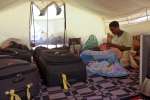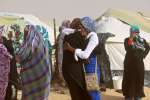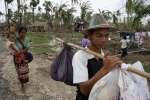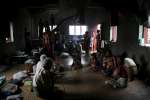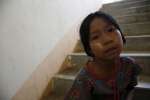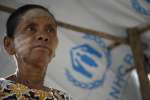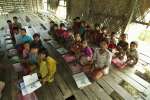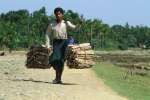- Text size
 |
|  |
|  |
| 
- Français
Manpower and UNHCR empower refugees resettling to the US
News Stories, 22 July 2010
MAE LA REFUGEE CAMP, Thailand, July 22 (UNHCR) – A single mother of two, Karen refugee Ah Ywa Paw, 26, decided to seek resettlement in the United States so her small sons can get a good education.
She's already set a good example for them by being a successful student herself in a skills-building pilot project designed to equip Myanmar refugees in this camp in northern Thailand to work in American offices. It's a partnership between the UN refugee agency and Manpower Inc., a world leader in the employment services industry.
"I was told that the course would teach me how to work in an office and would improve my English," said the young woman, who already speaks three other languages. "I realize that I've learned so much from this course. I learnt how to submit a leave request, how to use a photocopying machine and other basic skills. My English language has also improved."
Under the pilot project, 19 refugees – seven women and 12 men – have completed six weeks of classroom training in the camp. Through videos, role-playing and live instruction by specially-trained instructors and Manpower staff volunteers, refugees learned all the basic skills needed to work in any office in the United States. A further 30 refugees will be accepted for a second six-week course due to start in July.
For refugees who live in thatched huts in a jungle, the subject matter – taught in English – was rather exotic: planning a day in an office, buying food in a cafeteria, socializing with co-workers during lunchtime, reporting on progress at work, making photocopies, filing documents, transferring telephone calls and other essential office skills.
"The trainers were so patient with us," Ah Ywa Paw said, exuding quiet confidence. "Students in the training have different educational background and some just could not catch up. But the trainers did not mind explaining the lessons to us. I just wish that the course lasted longer than six weeks".
Simon Matthews, country manager of Manpower Thailand, observed that it was important to teach the refugees the skills they would need to get along with their bosses and co-workers in a culture that will be new to them, as well as actual jobs skills.
In all, 38 Thai Manpower employees volunteered their time to act as instructors and coaches, while much of the training was conducted by ZOA, a Netherlands-based refugee care organization, using materials prepared by Manpower staff.
The pilot project was aimed at refugees selected for resettlement to the United States under the world's largest resettlement programme, which has seen more than 55,000 Myanmar refugees depart from camps in Thailand since 2005.
The genesis of the project was a visit to a Thai refugee camp in 2007 by UNHCR's Council of Business Leaders, executives of some of the world's top corporations who advise UNHCR on how to be more business-like in carrying out its humanitarian work. David Arkless, then Manpower's senior vice-president, was deeply impressed by a young articulate Karen refugee who was about to be resettled to the US but was worried about finding a job while he studied.
Arkless put his mind to matching up resettling refugees with Manpower offices in the US and eventually this training scheme was born.
Zar Ki Rah, 19, is in much the same position as the young refugee man Arkless met three years ago – she wants to study in the US but knows she might need to find a job to support her parents. She's hoping Manpower will help her with job placement as she begins to carve out a new life after 11 years in Mae La camp.
"I am good at mathematics and computer," she ventured shyly. "With these two skills combined, I think I will do a good job being an accountant."
Under a second phase of the project, Manpower plans to link up 15 of the first group with Manpower offices in their new American cities for continuing counselling and advice on how to find and hold a job.
Ah Ywa Paw has seen her younger sister go ahead of her for resettlement in the US and get a job as a saleswoman in a greeting card store.
This week it's her turn to take her two sons, seven and two, to the US and the UNHCR-Manpower project gets her endorsement: "For other refugees who have already been accepted to the US, I would like to let them know that this training is a very good opportunity for them to learn English, which is the most important skill to have when arriving in the U.S."
By Kamolmas Jaiyen in Mae La Refugee Camp, Thailand













